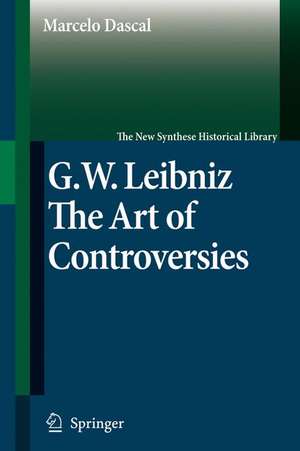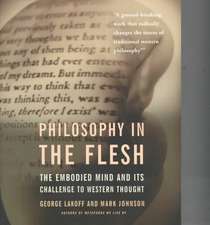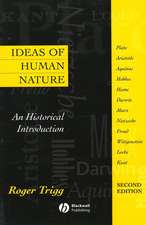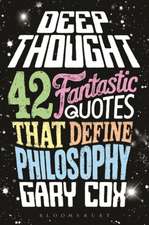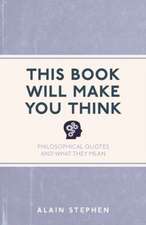Gottfried Wilhelm Leibniz: The Art of Controversies: The New Synthese Historical Library, cartea 60
Autor Marcelo Dascal Q. Racionero, A. Cardosoen Limba Engleză Paperback – 22 ian 2008
Both his theoretical and practical activities were informed by a philosophical mind that sought in all circumstances the most general underlying principles; by a juridical mind that sought to bring order and structure to human interaction, without sacrificing the necessary flexibility; by an argumentative mind that knows that persuading is often more important than proving; by a scientific mind eager to organize past and present knowledge so as not to miss any bit of information capable of pointing the way to new discoveries; by a theologian mind that refuses to admit that religious conflicts between true believers are irresolvable; and by an ethical and political mind whose major concern is to direct all our intellectual work towards improving the well-being of humankind.
| Toate formatele și edițiile | Preț | Express |
|---|---|---|
| Paperback (1) | 1225.28 lei 6-8 săpt. | |
| SPRINGER NETHERLANDS – 22 ian 2008 | 1225.28 lei 6-8 săpt. | |
| Hardback (1) | 1231.60 lei 6-8 săpt. | |
| SPRINGER NETHERLANDS – 14 dec 2006 | 1231.60 lei 6-8 săpt. |
Din seria The New Synthese Historical Library
- 18%
 Preț: 950.52 lei
Preț: 950.52 lei - 18%
 Preț: 949.73 lei
Preț: 949.73 lei - 18%
 Preț: 946.24 lei
Preț: 946.24 lei - 18%
 Preț: 953.82 lei
Preț: 953.82 lei - 20%
 Preț: 1618.07 lei
Preț: 1618.07 lei - 15%
 Preț: 643.00 lei
Preț: 643.00 lei - 18%
 Preț: 955.56 lei
Preț: 955.56 lei - 15%
 Preț: 644.82 lei
Preț: 644.82 lei - 18%
 Preț: 1387.55 lei
Preț: 1387.55 lei - 18%
 Preț: 955.56 lei
Preț: 955.56 lei - 18%
 Preț: 951.47 lei
Preț: 951.47 lei - 15%
 Preț: 637.46 lei
Preț: 637.46 lei - 15%
 Preț: 644.63 lei
Preț: 644.63 lei - 18%
 Preț: 947.32 lei
Preț: 947.32 lei - 15%
 Preț: 644.49 lei
Preț: 644.49 lei - 15%
 Preț: 645.47 lei
Preț: 645.47 lei - 18%
 Preț: 953.82 lei
Preț: 953.82 lei - 18%
 Preț: 958.38 lei
Preț: 958.38 lei - 15%
 Preț: 639.25 lei
Preț: 639.25 lei - 15%
 Preț: 638.89 lei
Preț: 638.89 lei - 18%
 Preț: 953.65 lei
Preț: 953.65 lei - 18%
 Preț: 952.26 lei
Preț: 952.26 lei - 18%
 Preț: 950.52 lei
Preț: 950.52 lei - 15%
 Preț: 646.11 lei
Preț: 646.11 lei
Preț: 1225.28 lei
Preț vechi: 1494.23 lei
-18% Nou
Puncte Express: 1838
Preț estimativ în valută:
234.49€ • 243.90$ • 193.58£
234.49€ • 243.90$ • 193.58£
Carte tipărită la comandă
Livrare economică 14-28 aprilie
Preluare comenzi: 021 569.72.76
Specificații
ISBN-13: 9781402081903
ISBN-10: 1402081901
Pagini: 592
Ilustrații: LXXII, 520 p.
Dimensiuni: 155 x 235 x 31 mm
Greutate: 0.82 kg
Ediția:1st ed. 2006. 2nd printing 2008
Editura: SPRINGER NETHERLANDS
Colecția Springer
Seria The New Synthese Historical Library
Locul publicării:Dordrecht, Netherlands
ISBN-10: 1402081901
Pagini: 592
Ilustrații: LXXII, 520 p.
Dimensiuni: 155 x 235 x 31 mm
Greutate: 0.82 kg
Ediția:1st ed. 2006. 2nd printing 2008
Editura: SPRINGER NETHERLANDS
Colecția Springer
Seria The New Synthese Historical Library
Locul publicării:Dordrecht, Netherlands
Public țintă
ResearchCuprins
Vices of Mingled Disputes.- The Controversy of Controversies.- The Religion of a Peasant.- The Elements of Thinking.- The Balance of Law.- Can there be an Obligation to Believe?.- Controversies on Sacred Matters.- The Judge of Controversies.- Towards a Heuristics for Litigation.- The Method of Jurists and the Method of Doctors.- Interpretation and Argumentation in Law.- Towards a Heuristics for Discovery.- Estimating the Uncertain.- Towards a Numerical Universal Language.- The Encyclopedia and the Method of Discovery.- Towards a Heuristics for Persuading.- The Other’s Place.- Persuading a Skeptic.- On Controversies.- On Principles.- Two Prefaces to the General Science.- to a Secret Encyclopedia.- On the Creation of a New Logic.- New Openings.- Theology and the Principle of Contradiction.- Changing Religion.- Methods of Reunion.- An Ars Characteristica for the Rational Sciences.- ‘Characterizing’ Definitions and Demonstrating Propositions.- Advancing the Art of Discovery.- Correspondence with the Hamburg Jungians.- The Philosophical Sin Controversy.- Confronting the Catholic Hardliners.- Defining what Pertains to Faith.- Judgment of a Catholic Doctor.- Presumptions and Fictions in Legal Argumentation.- The ‘Method of Establishments’.- The Achievements of Logic and Beyond.- Pacts, Contracts, and Natural Law.- Approaching the Church of England.- Dialectic Principles and their Application.- The History and Tasks of Logic.- Bold Conjectures.- The Dynamics of Formulating and Expounding the System.- The Use of Logic Against Skepticism.
Recenzii
From the reviews:
“This book is an invaluable contribution to the history of (philosophical) ideas and also a contribution to the pragmatics of discussion and debate, including argumentation (in the vernacular sense) and logic. … should be read by philosophers of language (as well as historians of philosophy) as well as by pragmaticians and more generally by those who are concerned by the standards of public debates.” (Anne Reboul, Linguist List, April 2009)
"[...] an impressive scholarly achievement and an indispensable tool for understanding Leibniz's thinking on form and function of controversies." (Gerd Fritz, University of Gießen, Germany, Journal of Historical Pragmatics 9:1, 2008)
"The Art of Controversies is an outstanding collection of the most important Leibniz texts concerning his life-long obsession: the art of reasoning not merely in mathematics, but also and above all in human conflict. In the vast amount of existing literature on Leibniz, this book is a must-read." (Bernardino Orio de Miguel, Catedrático de Filosofía, 2008)
"This book … in its 45 chapters, newly translated or retranslated Leibnizan texts in which the philosopher pursues his lifelong passion for analyzing and refining the logical structure and practical conduct of intellectual debate. … This volume promises to function as a rich and important resource not only for Leibniz scholars and for scholars of early modern philosophy generally, but also for philosophers … . It should also prove valuable to historians of ideas, theorists of argumentation, logicians, and scholars of rhetoric." (Véronique M. Fóti, The Review of Metaphysics 61:2, 2007)
"[...] is a treasure trove for scholars interested in Leibniz's practical rationality and his practical action in general. [...] All in all, this is a very rich collection of translations of mostly unknown texts which will give food for thought for a longtime to come and will inspire scholars to dig deeper into this most interesting and ignored area of Leibniz's thought." (Markku Roinila, Studia Leibnitiana, Band XXXVIII/XXXIX, Heft 2, 2006/2007)
“This book is an invaluable contribution to the history of (philosophical) ideas and also a contribution to the pragmatics of discussion and debate, including argumentation (in the vernacular sense) and logic. … should be read by philosophers of language (as well as historians of philosophy) as well as by pragmaticians and more generally by those who are concerned by the standards of public debates.” (Anne Reboul, Linguist List, April 2009)
"[...] an impressive scholarly achievement and an indispensable tool for understanding Leibniz's thinking on form and function of controversies." (Gerd Fritz, University of Gießen, Germany, Journal of Historical Pragmatics 9:1, 2008)
"The Art of Controversies is an outstanding collection of the most important Leibniz texts concerning his life-long obsession: the art of reasoning not merely in mathematics, but also and above all in human conflict. In the vast amount of existing literature on Leibniz, this book is a must-read." (Bernardino Orio de Miguel, Catedrático de Filosofía, 2008)
"This book … in its 45 chapters, newly translated or retranslated Leibnizan texts in which the philosopher pursues his lifelong passion for analyzing and refining the logical structure and practical conduct of intellectual debate. … This volume promises to function as a rich and important resource not only for Leibniz scholars and for scholars of early modern philosophy generally, but also for philosophers … . It should also prove valuable to historians of ideas, theorists of argumentation, logicians, and scholars of rhetoric." (Véronique M. Fóti, The Review of Metaphysics 61:2, 2007)
"[...] is a treasure trove for scholars interested in Leibniz's practical rationality and his practical action in general. [...] All in all, this is a very rich collection of translations of mostly unknown texts which will give food for thought for a longtime to come and will inspire scholars to dig deeper into this most interesting and ignored area of Leibniz's thought." (Markku Roinila, Studia Leibnitiana, Band XXXVIII/XXXIX, Heft 2, 2006/2007)
Textul de pe ultima copertă
Leibniz is known to the wide public and to many scholars mainly as a logician and mathematician, and as the creator of a fascinating but strange metaphysical system. In these, as well as in other fields, his remarkable innovations were achieved through painstaking efforts to establish a fruitful critical dialogue with the leading contemporary thinkers. He was no less important, however, in his practical endeavor to bring opponents to negotiate reasonable solutions to key political and religious conflicts of his time.
Both his theoretical and practical activities were informed by a philosophical mind that sought in all circumstances the most general underlying principles; by a juridical mind that sought to bring order and structure to human interaction, without sacrificing the necessary flexibility; by an argumentative mind that knows that persuading is often more important than proving; by a scientific mind eager to organize past and present knowledge so as not to miss any bit of information capable of pointing the way to new discoveries; by a theologian mind that refuses to admit that religious conflicts between true believers are irresolvable; and by an ethical and political mind whose major concern is to direct all our intellectual work towards improving the well-being of humankind.
All these perspectives (and more) are united in what this book identifies as his Art of Controversies, which might also be called an Art of Dialectical Cooperation. For it is based on the idea that knowledge production, acquisition, and evolution is not a one-man affair, but the result of the cooperation of many, coming from different perspectives; whence it follows that not only tolerance vis-à-vis the other, but also valuing the other’s contribution and integrating it – whether it stems from another age, continent, culture, discipline, religion, or individual – is indispensable. This dialectical Leibniz that emerges from the selected texts heretranslated, commented, and interpreted in the light of their context, isn’t for sure the familiar one. Yet, perhaps surprisingly, it is capable of shedding light on that old, familiar, yet incomplete image of Leibniz, and of adding thus a further reason for cherishing and cultivating the heritage of a truly great man.
Both his theoretical and practical activities were informed by a philosophical mind that sought in all circumstances the most general underlying principles; by a juridical mind that sought to bring order and structure to human interaction, without sacrificing the necessary flexibility; by an argumentative mind that knows that persuading is often more important than proving; by a scientific mind eager to organize past and present knowledge so as not to miss any bit of information capable of pointing the way to new discoveries; by a theologian mind that refuses to admit that religious conflicts between true believers are irresolvable; and by an ethical and political mind whose major concern is to direct all our intellectual work towards improving the well-being of humankind.
All these perspectives (and more) are united in what this book identifies as his Art of Controversies, which might also be called an Art of Dialectical Cooperation. For it is based on the idea that knowledge production, acquisition, and evolution is not a one-man affair, but the result of the cooperation of many, coming from different perspectives; whence it follows that not only tolerance vis-à-vis the other, but also valuing the other’s contribution and integrating it – whether it stems from another age, continent, culture, discipline, religion, or individual – is indispensable. This dialectical Leibniz that emerges from the selected texts heretranslated, commented, and interpreted in the light of their context, isn’t for sure the familiar one. Yet, perhaps surprisingly, it is capable of shedding light on that old, familiar, yet incomplete image of Leibniz, and of adding thus a further reason for cherishing and cultivating the heritage of a truly great man.
Caracteristici
A new picture of Leibniz emerges clearly from this book: a thinker actively working for the solution of acute conflicts and developing the intellectual means for that purpose Controversy – as Leibniz teaches us in his Art of Controversies – does not mean fight and quarrel, but rather the willingness to learn from the other, the readiness to discover in what seems to be an implacable opponent, someone who in fact shares with us basic assumptions which can form the ground for a solid cooperation and partnership Leibniz’s ‘rationalism’ is not restricted to a concern with expanding and applying a logical and mathematical model of thought and action As the texts collected, translated, and commented in this book show, rationality for him must also – if it wishes to be relevant to conflict plagued individual and social life – be able to display enough flexibility, without thereby falling into arbitrariness
